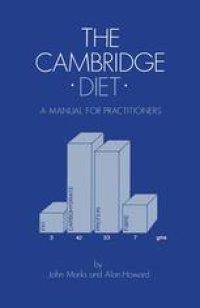
Ebook: The Cambridge Diet: A Manual for Practitioners
- Tags: General Practice / Family Medicine, Nutrition
- Year: 1987
- Publisher: Springer Netherlands
- Edition: 1
- Language: English
- pdf
Obesity in affluent countries continues to be a serious problem. When one runs an Obesity Clinic there appears to be an unending series of patients who need help. Our understanding of weight control has been advanced not only by the studies of obese patients but also by our investigation of the problems of weight gain in young women with anorexia nervosa. Just as among obese patients there is the group of 'efficient metabolizers' who can maintain their excessive weight with a calorie intake occasion ally as low as 600 kcal per day, so we have demonstrated that among anorexic women there are a few who may fail to gain normal weight with 3500 kcal per day. Some of the latter group may in fact develop T3 (tri-iodothyronine) thyrotoxicosis. One of the major unknown factors is still what determines when patients may be at these extremes. If we knew how to control these extremes we would like, for a time, to switch each to the opposite end of the spectrum. One factor which is becoming apparent from studying people in the machine which continually plots metabolic rate is that the metabolic response to food is a' major factor in determining a person's weight. In general terms there is a tendency for those who are below their ideal weight to have an increased metabolic response to food and those who are above ideal weight to have a reduced metabolic response to food.